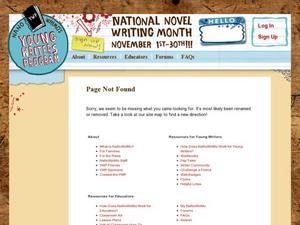Curated OER
Lesson Plan 4: Creating Main Characters
Creating a good main character is a must when writing a creative narrative or novel. Elementary aged writers create main characters for the novel they are writing. They first use themselves as a models, then create a character as a...
Curated OER
Lesson Plan 5: Creating a Supporting Character
As a class, young writers learn how to develop a strong supporting character. They think and discuss a good friend they know, they use that friend as a basis for a potential supporting character. They create a supporting character as a...
Curated OER
Michelle Kwan: Heart of a Champion
Who is a champion to your class? Elementary and middle schoolers think of a role-model from their lives. Then, in their journals, they write evidence of that person's perseverance. They identify the character trait of perseverance with...
Curated OER
Educator's Guide: Holes
You'll be a star at your next grade level meeting with an educational unit on Louis Sachar's Holes. Based on both the novel and film, the lessons include applications to language arts with character studies and movie reviews; social...
Curated OER
Teaching Julius Caesar: A Differentiated Approach
While the themes of Julius Caesar may appeal to most readers, the act of reading the play can be a challenge. A unit plan related to the popular play by Shakespeare provides lesson plans and activities designed for differentiated...
Curated OER
Character Ambassadors
Students act as ambassadors. In this character education instructional activity, students take on the roles of ambassadors of the character traits listed. Students write essays regarding the character traits they select.
Curated OER
Great Expectations: Group Writing
Examine the differences between totalitarianism and democracy in this writing lesson. Using the same format and theme from Great Expectations, young writers work in pairs to compose their own short stories. They follow guidelines for the...
Waunakee Community School District
Identifying Themes in Literature
If your language arts learners have a hard time determining the universal theme of a written work, use a straightforward worksheet to help them find it. After reviewing a list of common themes, kids note the title, character, plot, point...
Curated OER
Lesson Plan for Korea: P'ansori
Twelfth graders read different versions of P'ansori in an attempt to gain exposure to this form of literature. They gain information in order to help understand the context of how they are part of the Korean culture.
Curated OER
Trust Circles
Students explore trustworthiness. In this character development lesson plan, students brainstorm synonyms for trustworthiness. Students consider two communities to which they belong, and compare and contrast these communities by...
Curated OER
Civil War Diaries
Fifth graders examine excerpts from a diary of a Confederate soldier and his experiences in a Union prison camp. After receiving character cards, they write diary entries from the perspectives of their Civil War identity. As an...
Curated OER
Trustworthy Reputation
Seventh graders explore the character trait of reputation. For this character education lesson, 7th graders focus on their personal reputation as they discuss positive character traits and reflect on character quotations in journal entries.
Curated OER
Trustworthy Reputation
Seventh graders explore psychology by writing reflections about quotations. For this human behavior lesson, 7th graders read a list of famous quotes about trust by men such as Benjamin Franklin and William Shakespeare. Students complete...
Curated OER
Two Trustworthy Texans
Students read essays. In this character education lesson, students read about two Texans, answer question about them and discuss their contributions.
Orange County Department of Education
Dear Mr. Henshaw
Fifth graders read Dear Mr. Henshaw and identify the character trait of self-respect as exhibited by Leigh throughout the story. They evaluate the author's use of letters to tell the story and discuss how the story would be different if...
Curated OER
The Freddy the Pig Series
Students read the series of books called The Freddy the Pig Series by Walter R. Brooks and complete activities with them. In this The Freddy the Pig Series lesson plan, students write poetry, create drama, write in journals, do...
National Endowment for the Humanities
Hamlet Meets Chushingura: Traditions of the Revenge Tragedy
Students read texts, view film and video and conduct research in an analysis and comparison of Shakespeare's "Hamlet" and the Kabuki piece "Chushingura". They focus their analysis on the theme of revenge.
Curated OER
Posting Personal Testimonies on the Web
Students read literature based on family heroes. They discuss the concepts of friendship, loyalty and death. They write their own stories of courage and post them to a webpage.
Curated OER
A Guilty Gertrude: Performing Speaking and Silent Moments in Hamlet
Students examine Gertrude's (in Hamlet) behavior, lines and thoughts for what it reveals about Ophelia's madness. They synthesize what they know about Gertrude to perform her character in a scene. They write stage directions and discuss...
Bright Hub Education
Teaching "Gone with the Wind" in High School: Ideas & Activities
Plan on using Gone with the Wind as a reading selection? Here's a packet of prompts for activities and assessments.
Orange County Department of Education
Black Cowboy, Wild Horses
Fifth graders read the selection Black Cowboy, Wild Horses and identify characteristics of self-discipline shown by story's main character, Bob Lemmons. Students then identify some of their own traits of self-discipline and reflect upon...
Orange County Department of Education
Katie's Trunk
Fifth graders read the story of "Katie's Trunk". They identify the traits of integrity and fairness in the characters John Warren and Katie. Students explore how people can experience the same event but interpret it differently. They...
Curated OER
Good Brother, Bad Brother
Studetns study how biographers create characters and history of individuals in biographies. They complete a variety of writting activities to demonstrate understanding.
























